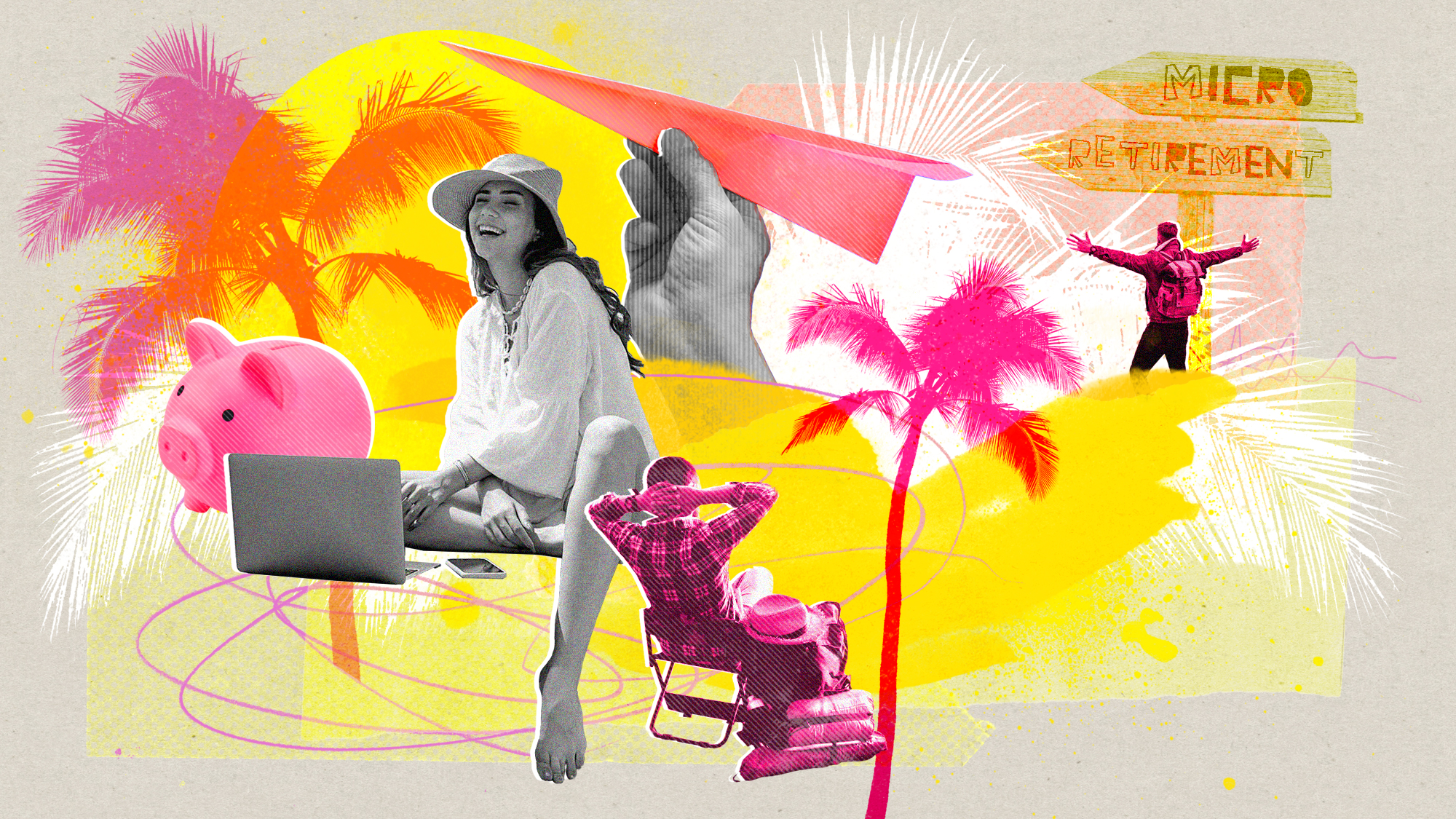Out of office: Microretirement is trending in the workplace
Long vacations are the new way to beat burnout


A free daily email with the biggest news stories of the day – and the best features from TheWeek.com
You are now subscribed
Your newsletter sign-up was successful
Retirement, at least in some form, may be possible sooner than you expect and could happen many times during your professional career. As people live longer and spend more years working, many have opted to pursue “microretirement” or take extended breaks from work without pay. This gives people a chance to rest but can also hold them back from career advancement and future stability.
What is microretirement?
Microretirement is a trend where people take regular breaks from work, usually lasting weeks or even months, with plans to return to their jobs after. This time can be used for relaxation, travel or some personal project or passion. These breaks are “not your standard PTO,” because “they’re intentional, unpaid time to rest and recharge,” said Fast Company. Microretirements can take many forms, including quitting a job and only finding a new one once you are ready to work again, “setting up a plan with your employer that allows you to take unpaid frequent work breaks” or “taking breaks from your business if you’re a business owner.” This is different from quiet vacationing, in which people still appear to be working while on a trip or out of the office.
The trend has grown popular across all age groups, and only 21% of employees worldwide describe themselves as engaged in their jobs in 2024, according to Gallup’s State of the Workplace Report. Gen Z has particularly taken to it, “using microretirement to avoid burnout, find greater fulfillment in their work and enhance their overall well-being,” said Fast Company. This is largely because of that generation’s emphasis on the work-life balance. It also makes “sense from a health perspective to do adventurous travel while you’re in peak health,” said The Independent. On the other hand, “taking a break in mid-life or later has some obvious perks, including the likelihood of better financial stability.”
The Week
Escape your echo chamber. Get the facts behind the news, plus analysis from multiple perspectives.

Sign up for The Week's Free Newsletters
From our morning news briefing to a weekly Good News Newsletter, get the best of The Week delivered directly to your inbox.
From our morning news briefing to a weekly Good News Newsletter, get the best of The Week delivered directly to your inbox.
Should you do it?
The concept of taking extended breaks from work is not new; professors and tech professionals have been known to take sabbaticals, for instance. Now, an “increased lifespan may be turning that luxury into a necessity for others who work much longer than previous generations,” said Forbes. “As we live and work longer, retirement can feel so far away,” said Michael Edwards, the managing director of Explore Worldwide, to The Independent. “There’s a sense of ‘why should I wait?’ None of us know what the future holds and for many, retirement might feel too late to do the sort of traveling we have our heart set on.”
There are some downsides to microretirement, especially concerning a person’s financial future. Taking time away from a job can “affect your earnings, investments and funding your retirement,” said Fast Company. It can additionally affect potential career growth. You “could also be seen as a job hopper to some decision-makers within the labor market,” said Kenyetta Nesbitt-Simmons, a senior partner at HR consultancy firm Simmons HR & Talent Advisory, to Fast Company. This may pose a particular problem in competitive fields where a microretirement could be seen as slacking off.
A free daily email with the biggest news stories of the day – and the best features from TheWeek.com
Devika Rao has worked as a staff writer at The Week since 2022, covering science, the environment, climate and business. She previously worked as a policy associate for a nonprofit organization advocating for environmental action from a business perspective.
-
 Sepsis ‘breakthrough’: the world’s first targeted treatment?
Sepsis ‘breakthrough’: the world’s first targeted treatment?The Explainer New drug could reverse effects of sepsis, rather than trying to treat infection with antibiotics
-
 James Van Der Beek obituary: fresh-faced Dawson’s Creek star
James Van Der Beek obituary: fresh-faced Dawson’s Creek starIn The Spotlight Van Der Beek fronted one of the most successful teen dramas of the 90s – but his Dawson fame proved a double-edged sword
-
 Is Andrew’s arrest the end for the monarchy?
Is Andrew’s arrest the end for the monarchy?Today's Big Question The King has distanced the Royal Family from his disgraced brother but a ‘fit of revolutionary disgust’ could still wipe them out
-
 Companies are increasingly AI washing
Companies are increasingly AI washingThe explainer Imaginary technology is taking jobs
-
 Ski town strikers fight rising cost of living
Ski town strikers fight rising cost of livingThe Explainer Telluride is the latest ski resort experiencing a patroller strike
-
 How prediction markets have spread to politics
How prediction markets have spread to politicsThe explainer Everything’s a gamble
-
 SiriusXM hopes a new Howard Stern deal can turn its fortunes around
SiriusXM hopes a new Howard Stern deal can turn its fortunes aroundThe Explainer The company has been steadily losing subscribers
-
 Unemployment rate ticks up amid fall job losses
Unemployment rate ticks up amid fall job lossesSpeed Read Data released by the Commerce Department indicates ‘one of the weakest American labor markets in years’
-
 The longevity economy booms as people live longer
The longevity economy booms as people live longerThe Explainer The sector is projected to reach $27 trillion by 2030
-
 Employees are branching out rather than moving up with career minimalism
Employees are branching out rather than moving up with career minimalismThe explainer From career ladder to lily pad
-
 Fast food is no longer affordable for low-income Americans
Fast food is no longer affordable for low-income AmericansThe explainer Cheap meals are getting farther out of reach
